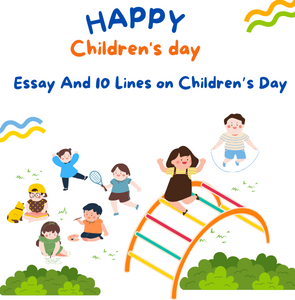You must have heard about Pandit Jawaharlal Nehru, the first Prime Minister of our country and a revered leader. His birthday is celebrated as Children’s Day in India. In this blog, we will explore Children’s Day, delve into a short essay about Jawaharlal Nehru, and discover some of his notable books. Moreover, there are intriguing stories about Nehru’s life that will not only inspire you but also make for an interesting read. If you’re curious about his fascination with science, one such captivating story awaits you in the pages of “My Big Book of Values 4” by Ratna Sagar.
Now, let’s dive into the blog.
10 Lines on Children’s Day
1. Children’s Day is celebrated on November 14th every year to mark the birth anniversary of Pandit Jawaharlal Nehru, the first Prime Minister of India.
2. The day is dedicated to recognising the importance of children and advocating for their rights and well-being.
3. Jawaharlal Nehru, affectionately known as Chacha Nehru, had a deep affection for children, and the day is a tribute to his love for the younger generation.
4. Schools and educational institutions organise cultural events, competitions, and activities to celebrate Children’s Day.
5. The occasion serves as a reminder to promote education, health, and overall welfare for children across the nation.
6. Children often participate in special programs showcasing their talents in music, dance, and sports, fostering a sense of joy.
7. Many schools distribute sweets and organise fun-filled events to make the day memorable for the children.
8. On Children’s Day, adults, including parents and teachers, express their gratitude for the innocence, creativity, and potential of children.
9. The day emphasises the need to protect children and ensure a safe and nurturing environment for their growth.
10. Jawaharlal Nehru believed that children are the future of our country. On Children’s Day, we should help children grow and develop. We should strive to make them active contributors to the nation’s welfare.
Short Essay on Jawaharlal Nehru
Pandit Jawaharlal Nehru was the first prime minister of India. He was a great freedom fighter and a visionary leader. He was born on 14 November 1889 in Allahabad in British India.
He played an important role in the Indian independence movement alongside Mahatma Gandhi.
Affectionately known as “Pandit Nehru,” he was a man with a modern and progressive vision.
Jawaharlal Nehru was very fond of children. Children lovingly called him Chacha Nehru.
Jawaharlal Nehru has written many notable books like The Discovery of India and Glimpses of World History. Nehru was also an important contributor to the Indian Constitution and worked tirelessly for the country’s socio-economic development. Nehru initiated many reforms in India and introduced industrialisation and modernisation. Every year his birthday is celebrated as Children’s Day in India.
Things to Learn from the Best Books by Jawaharlal Nehru
The Discovery of India:
Children can learn about India’s rich history, from ancient civilizations to the struggle for independence. Nehru discusses India’s philosophical contributions, helping children understand different ways of thinking and approaching life. The book delves into India’s fight for independence, teaching children about the importance of freedom and the role individuals can play in shaping their nation’s destiny. Nehru also touches on India’s geography, providing basic knowledge about the country’s landscapes, rivers, and natural features.
Letters from a Father to his Daughter:
The letters provide a simple and engaging overview of India’s history, making it accessible for young readers. Nehru imparts moral and ethical values, promoting qualities such as empathy, kindness, and justice through the letters. The book often describes the beauty of nature and the importance of preserving the environment, instilling an appreciation for the natural world. The letters reveal a heartwarming bond between Nehru and his daughter, emphasising the importance of family and relationships.
Glimpses of World History:
The book provides a broad overview of world history, offering glimpses into different civilizations, cultures, and historical events. Children can learn about influential leaders, revolutions, and movements that have shaped the course of history. Nehru explores various political ideologies, helping children understand different systems of governance and their impact on societies.
An Autobiography of Jawaharlal Nehru:
Children can learn about Nehru’s life, his childhood, education, and the experiences that shaped him into a prominent political figure. Nehru’s autobiography reflects his ideals, values, and beliefs, providing a glimpse into the principles that guided his actions.
Read Also
10 Lines on Republic Day – Happy Republic Day of India
Essay on New Year – 10 Lines On New Year

